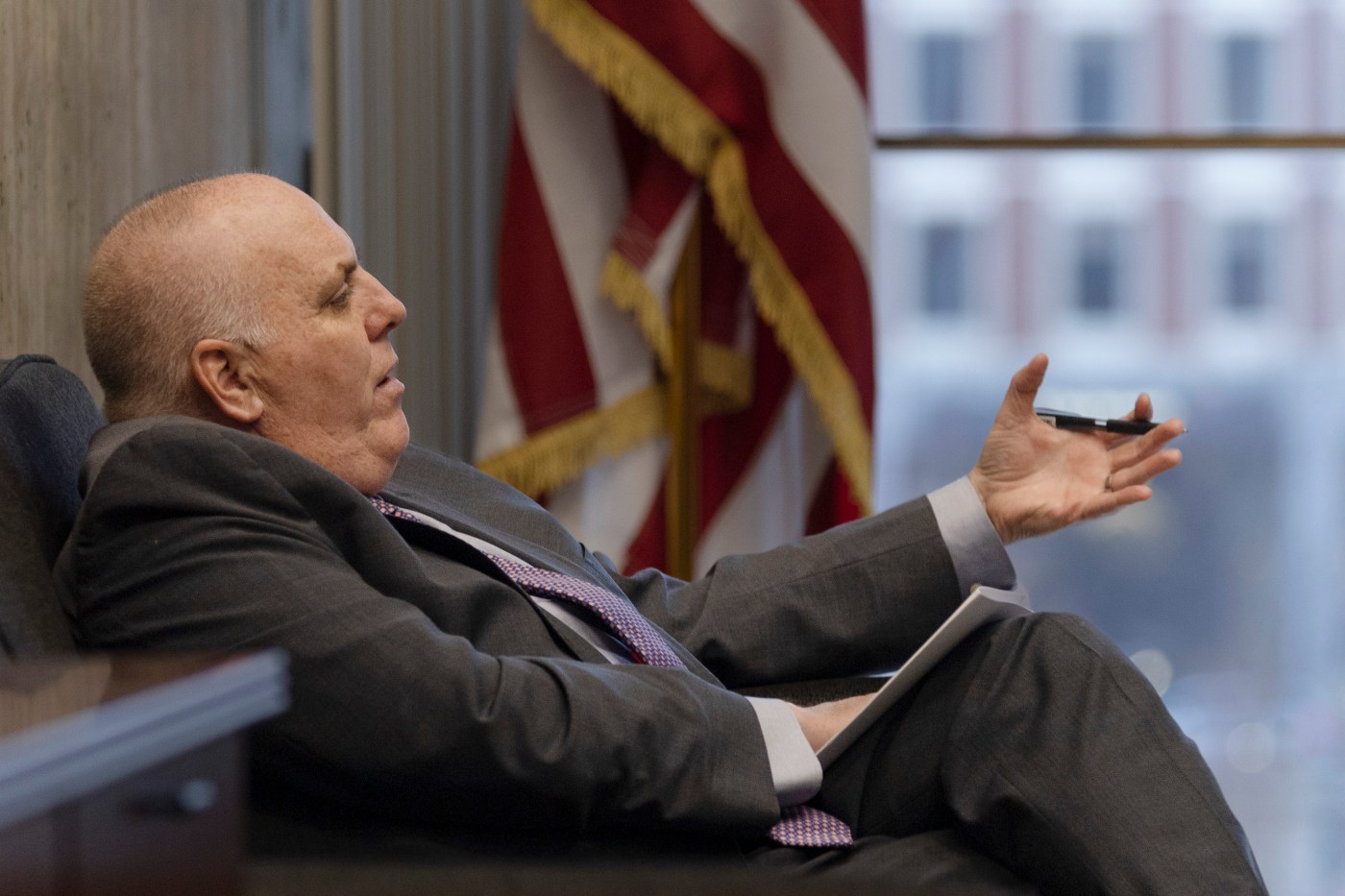
Ed Flynn defends his dad in wake of ‘Chuck’ Stuart HBO series
Outgoing Boston City Council President Ed Flynn defended his father’s “record on race relations” in the wake of criticism that’s been leveled at former Mayor Ray Flynn as part of a new documentary recounting the 1989 Stuart murder.
Flynn said that while he hasn’t seen the documentary, a collaboration between HBO and the Boston Globe released earlier this month, he is aware of what he described as his father’s past positive leadership on racial justice issues.
“He tried to bring the city together, especially during difficult and challenging times in Boston,” Flynn told the Herald, of his 84-year-old father. “I’m proud of his record on race relations.”
Ray Flynn, who was mayor from 1984-93, is praised early on in the three-part series for helping to heal a city mired in what his former chief mayoral advisor Neil Sullivan describes on camera as the “persistent racial violence” that continued years after Boston’s “desegregation controversy.”
Sullivan points to an instance where the former mayor Flynn, then a state representative, “came flying down the stairs and physically broke up” an altercation on the State House steps, where a Black man was attacked.
Ray Flynn is also said to have benefited from his past experience playing basketball, which one commentator Ron Hill said helped the former mayor connect with the boys at a gym he ran at the time in Mission Hill, one of Boston’s traditional majority-Black neighborhoods where the Stuart murder took place.
“I had a good working relationship with Ray Flynn until the Stuart case happened,” Hill said in the documentary.
The early praise heaped on former Mayor Flynn turns into persistent criticism for the remainder of the series, for his and the police department’s “unquestioning” acceptance of a story given by Charles “Chuck” Stuart, who orchestrated the killing of his pregnant wife, Carol, but blamed it on a random black man.
Related Articles
Boston City Council ‘not serious about public safety’: outgoing president Flynn says
Boston to have ‘strong’ police presence at New Year’s Eve First Night celebration
MA firefighter unions push Boston City Council to accept $13M counter-terrorism grant
Boston Mayor Michelle Wu’s home ‘swatted’ on Christmas Day
O’Bryant School move: BPS still open to compromises, Michelle Wu warns district must ‘move urgently’
Chuck Stuart told police a roughly 6-foot tall black man got in the car and told him to drive into the Mission Hill “projects” as part of an attempted robbery, before shooting his wife in the head, and him in the side.
The accusation set off an intense manhunt, inflaming the city’s racial tensions, as described in the documentary, which later shows that police batted away an early tip that Stuart asked a longtime friend to help plan his wife’s murder, and failed to question family members who suspected or were aware of his involvement.
Leadership at City Hall, including Flynn, the District Attorney’s office and the police department were confined by their mindset as “white, Irish Catholic” men, opines former Herald reporter Michelle Caruso, which made it difficult for them to believe it “could be anything other than what Chuck said.”
Rather, two black men, Alan Swanson and Willie Bennett, were wrongfully accused of the crime at different points of the investigation. Both were arrested for unrelated crimes, but were reported at the time as being prime suspects in the murder, although neither was ever charged in the Stuart case.
Chuck Stuart, after being implicated by one of his brothers for the murder, committed suicide by jumping off the Tobin Bridge. Police officials and then-Mayor Flynn held a press conference that morning, naming Stuart as the perpetrator and stating that the story he gave police was false.
The accusation prompted a “racial over-reaction,” writer Howard Bryant states in the documentary, saying that the prime suspect in these cases is usually the partner.
Two days after the series concluded with a message stating that the city and police department had never offered the Bennett family a formal apology, Mayor Michelle Wu and Police Commissioner Michael Cox held a press conference to issue a public apology to both Swanson and Bennett.
Swanson was at last week’s event, but Bennett, who served 12 years in prison for an armed robbery that occurred at a Brookline video store a week before the Stuart murder, did not appear. His family members accepted the apology on his behalf.
While former Mayor Flynn did not apologize publicly on behalf of the city, it was reported by various outlets, including the Herald, at the time that he had offered a private apology to the Bennett family.
“I do know my father’s commitment and leadership on racial justice issues, not just as mayor, but throughout his life as a sports coach as well has been very positive,” his son Councilor Ed Flynn said.
While he’s proud of his father’s record on race relations, Flynn said, “I also know that it takes everybody working together, respecting each other, and there’s a lot more work we have to do in the city.”
Flynn, whose 2-year term as Council president ends this month, said for his part, he’s worked hard to bring diversity into not just his staff, but has challenged the city and administration to “be as inclusive as we possibly can.”
“Race relations are something that’s never solved, but it’s something that you have to continue to work on, and you can do that from listening to people, talking to people and from your personal example as well,” Flynn said.
Tomorrow, Part II of Ed Flynn’s look-back at his tenure as council president. He will address the media Saturday at 3 p.m. 106 Union Wharf.

